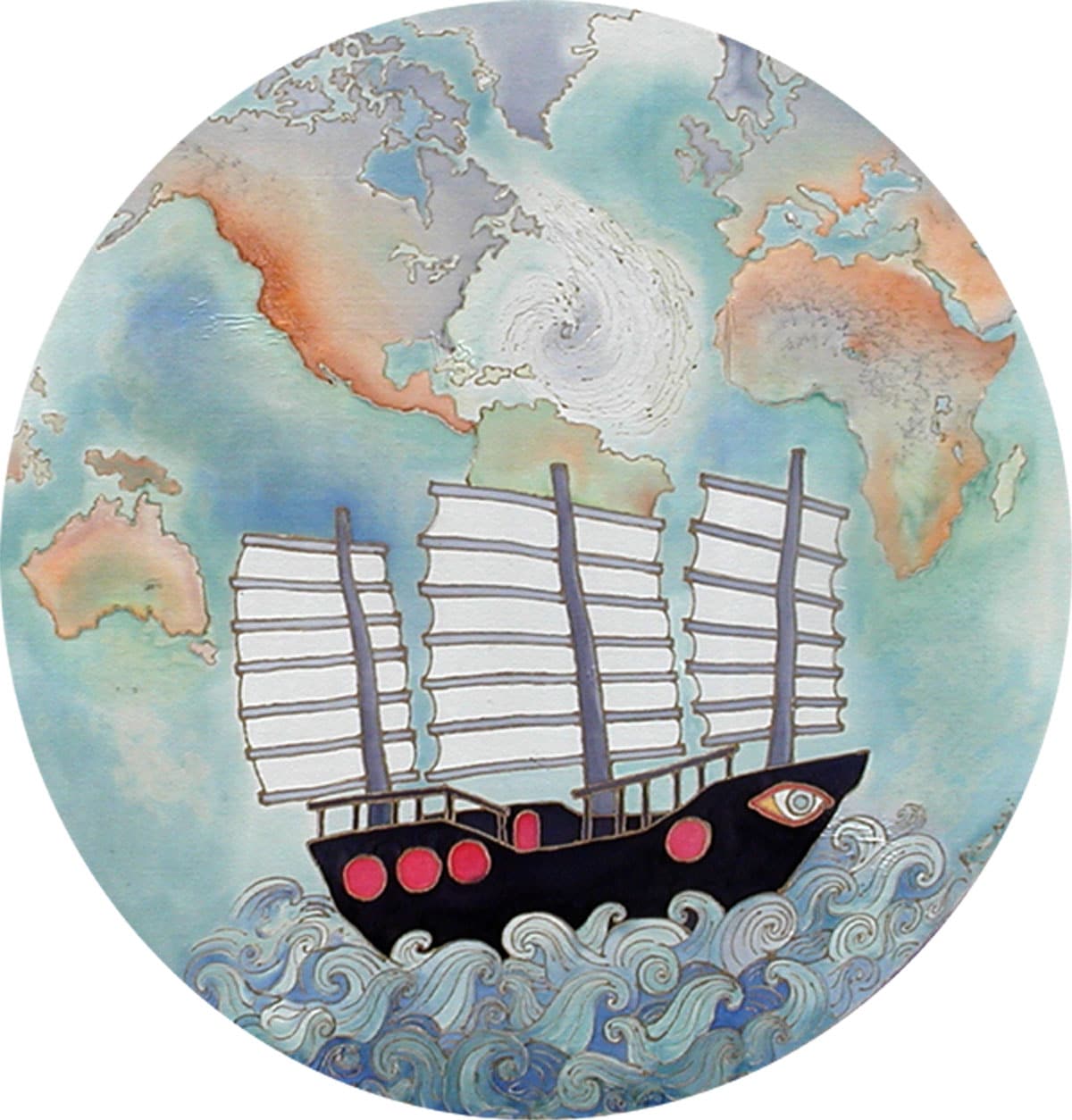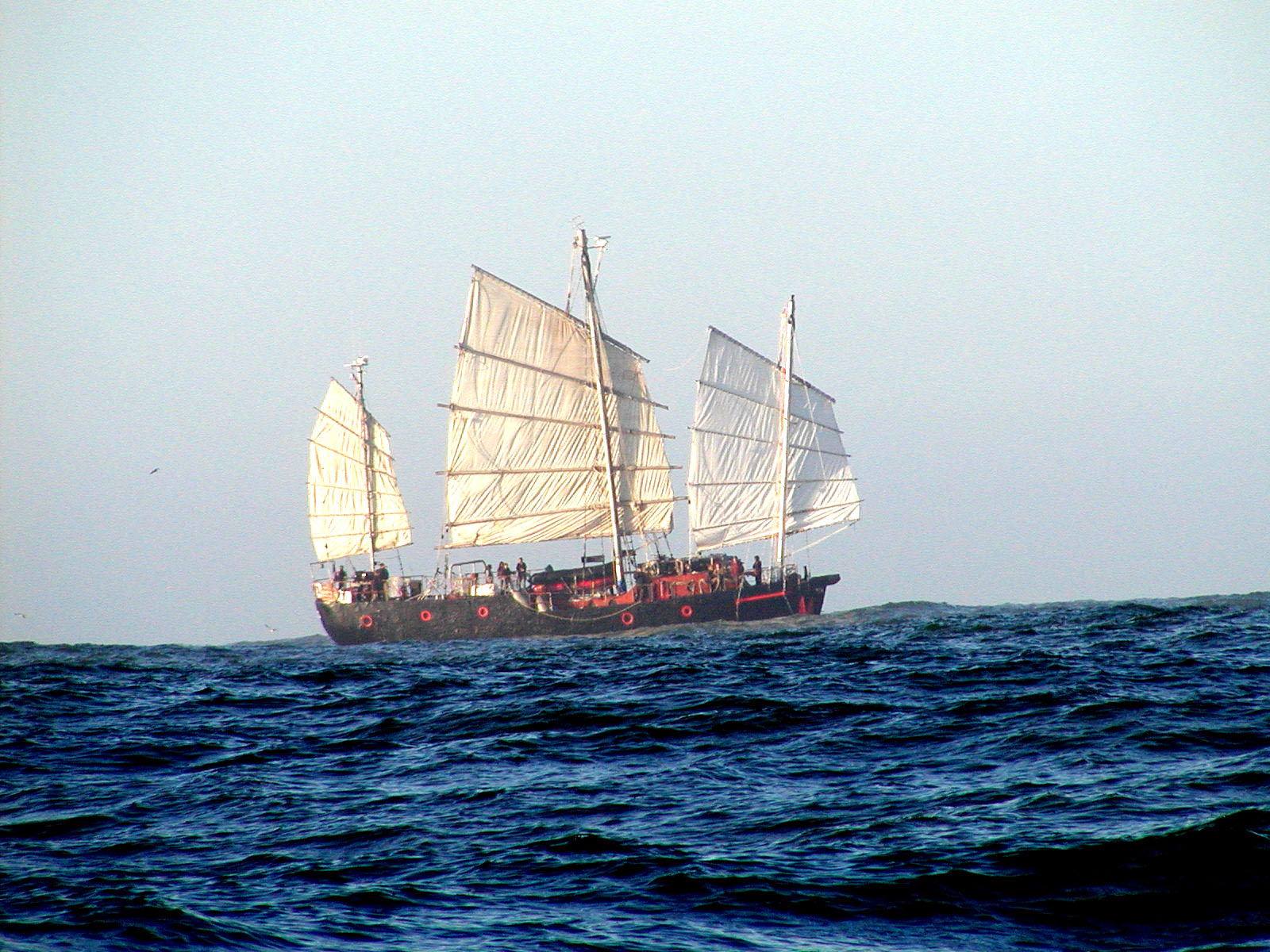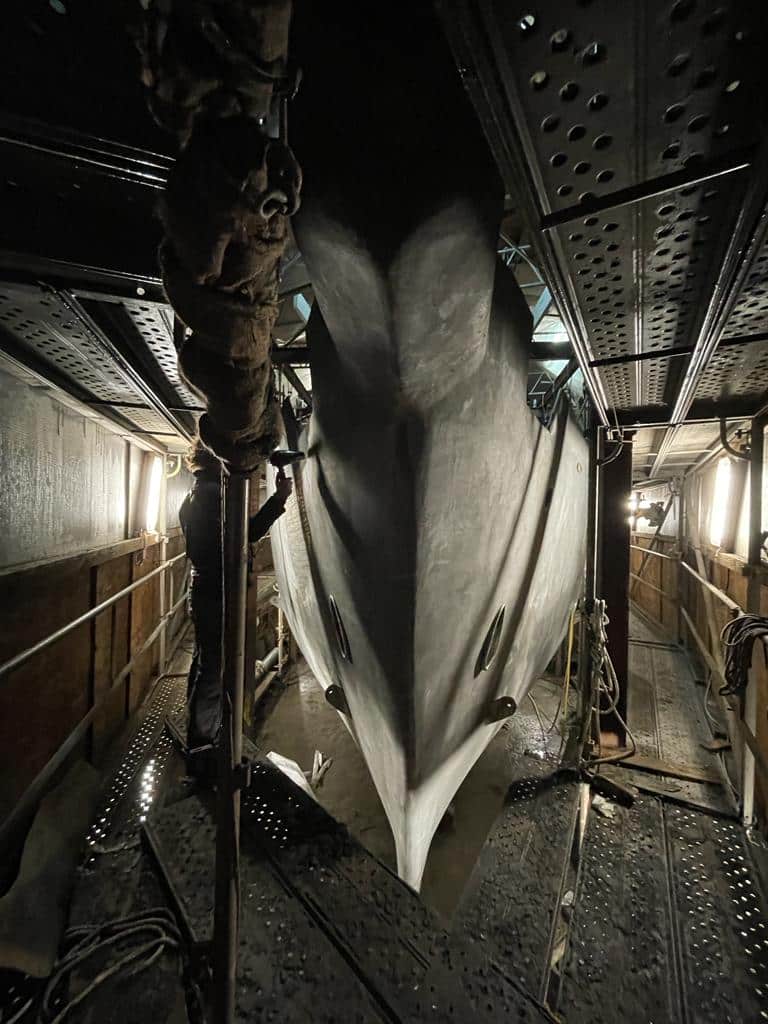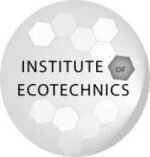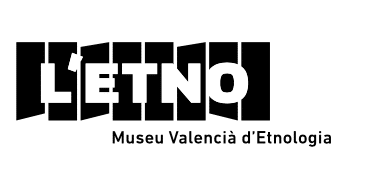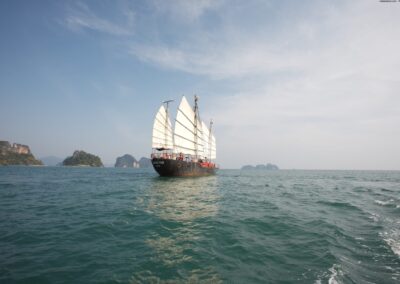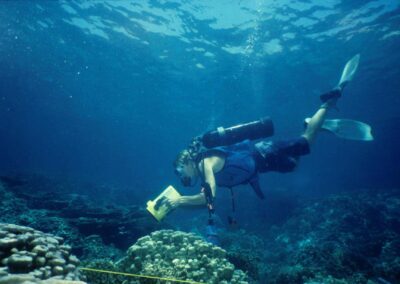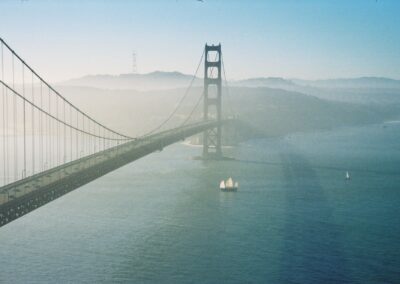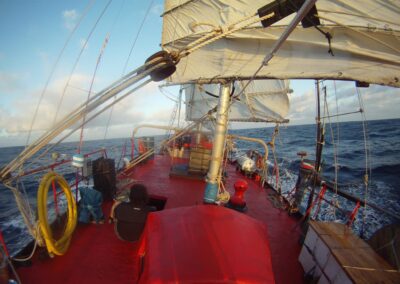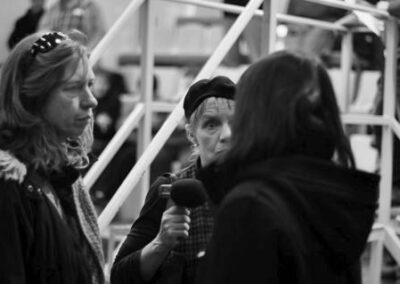Research Vessel Heraclitus
World OceansThe Heraclitus is a symbol of hope. A moving ship, a moving platform of poets, artists, dreamers, scientists, exemplifying, by their own sincerity and intent, our own human quest, celebrating everything that we are.
~ Wade Davis, ethnographer, writer, photographer, and filmmaker
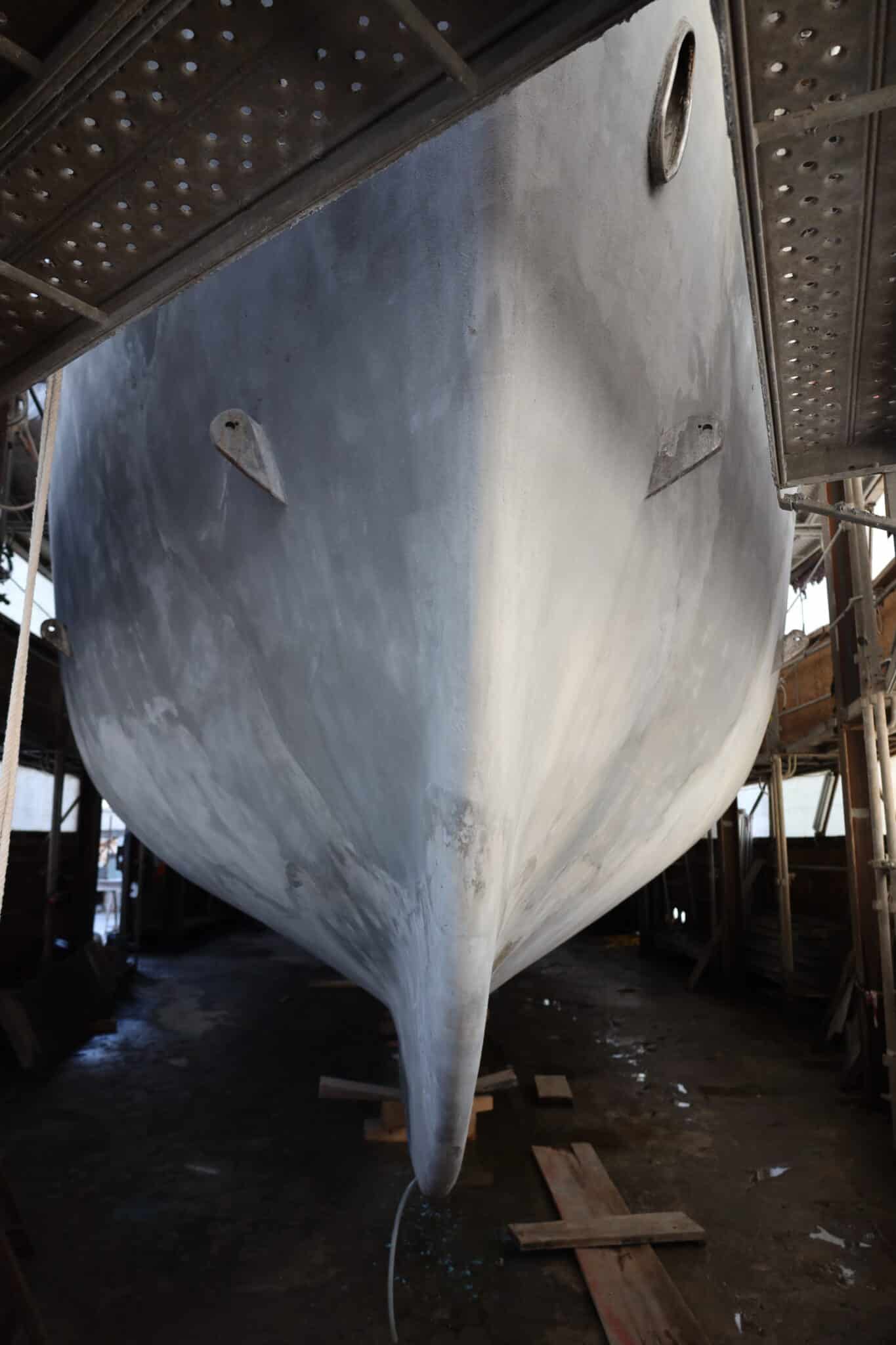
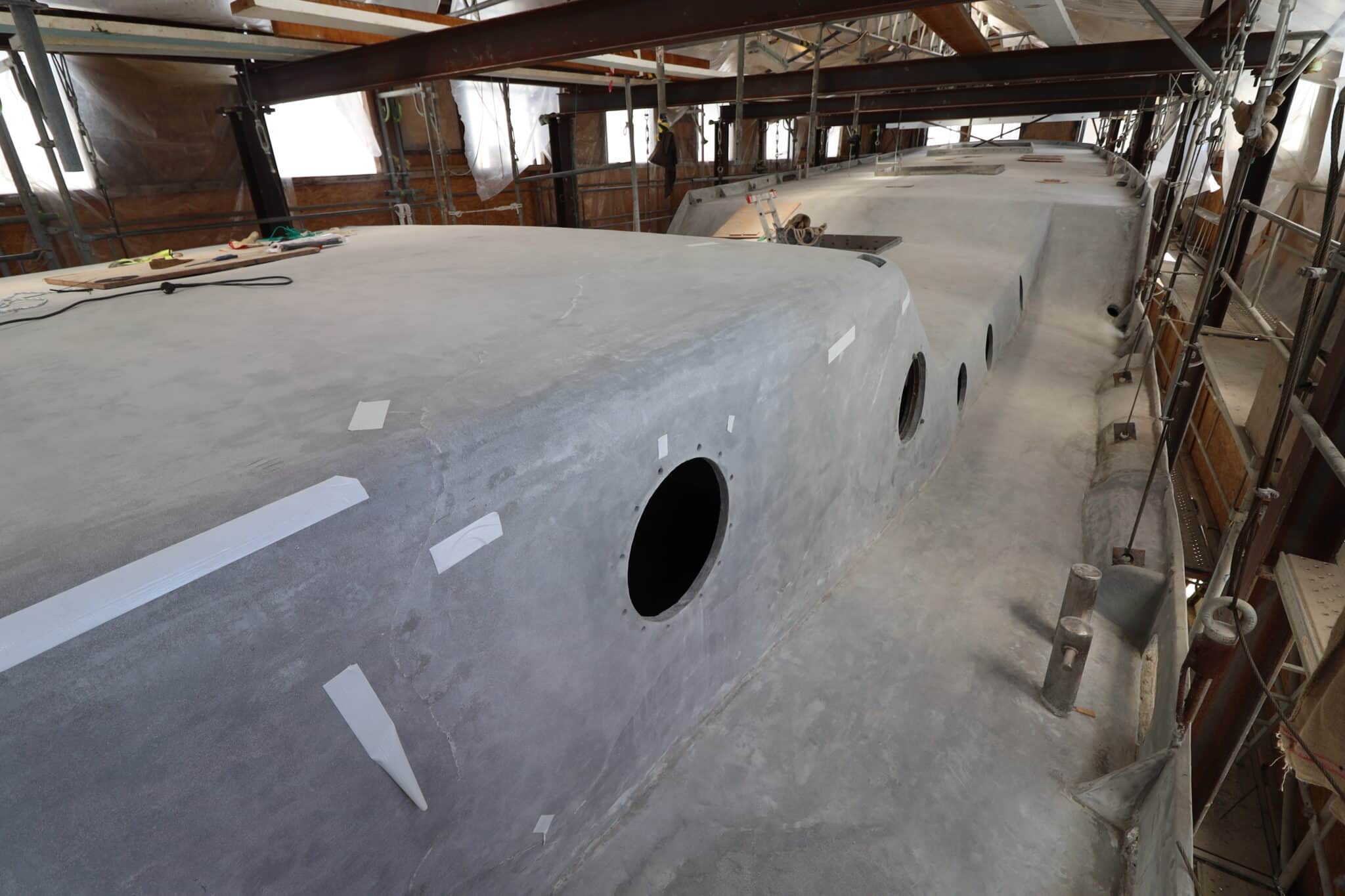
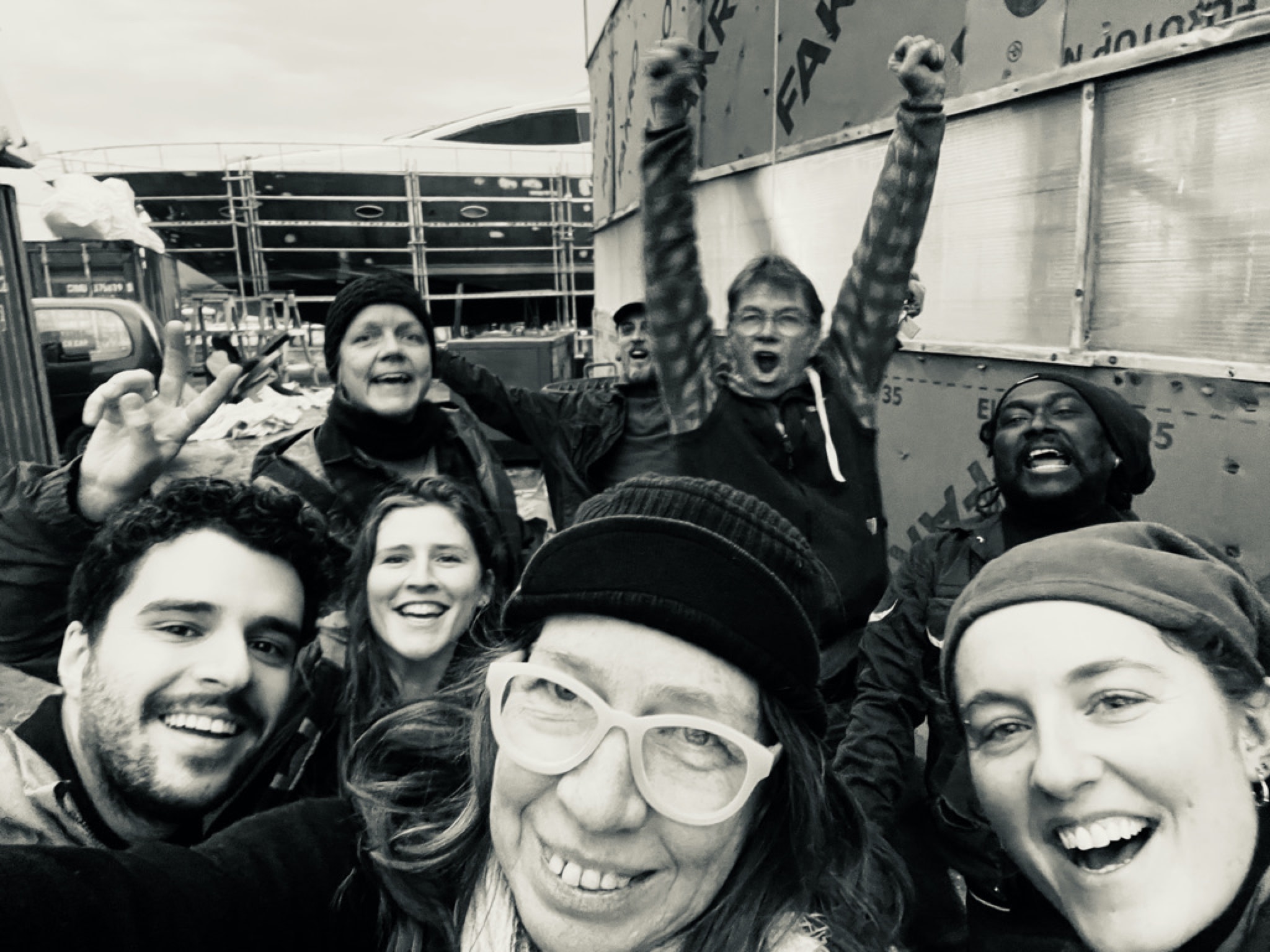
RESEARCH VESSEL HERACLITUS, the Chinese-junk research ship built by the Institute of Ecotechnics in 1975, has sailed the world’s oceans for over forty years, traveling more than 270,000 nautical miles in every sea except the Arctic.
Over the course of its twelve epic expeditions, the ship has been a nautical home to hundreds of seafarers from all walks of life, hailing from over fifty countries. The Heraclitus is a floating platform for arts, science, ecology and adventure. She conducts citizen science in marine ecologies, documents cultural oral history in coastal areas, and collects data documenting the quickening cycle of decline in our oceans from warming, acidification, and other impacts on the ocean ecosystems resulting from climate change impacts.
The ship has been in drydock in Rosés, Spain where it is in the last phase of a major rebuild. The new ferrocement hull has been completed and ready to be painted. We are seeking committed and skilled volunteers, sponsor and potential allies. Sealing and return to the water is planned for Spring 2024. Plans are to voyage to Colombia, the Amazon Basin and the Caribbean for a few years before continuing to sail the seven seas. On how to get involved please contact Expedition Chief Christine Handte, here.
Timeline
1975-Present
The RVH was built by members of the Institute of Ecotechnics (IE) in 1975-76 in Oakland, California. IE is an organization founded in 1973 which works on the harmonious integration of technics and ecology.
Key Milestones:
- The Construction of the RVH 1975
- The ship designed and built in Oakland, CA, by the Institute of Ecotechnics team; first expedition from San Francisco Bay to Panama.
- Meteorological Observations 1978
- Agreement with the National Oceanographic and Atmospheric Agency (NOAA) to collected weather data samples contributing to information available through land-based weather stations and were especially valuable because of the RVH’s ability to visit remote seas and locations.
- Shakedown voyages 1975-1979 –
- Indian Ocean circumnavigation; voyage from Australia to Malaysia.
- Amazon River Expedition 1980-1982
- Prof. Laurent Rivier, Plant Biology and Physiology, and Prof. Bo Holmstedt, Professor of Toxicology helped outfit the lab aboard RVH so that fresh plant samples and extracts could be tested for phytochemical activity.
- During the expedition, ethnobotanists Dr. Wade Davis, Harvard University Terrence McKenna and Dr. Dennis McKenna, senior research scientist for the Natural Health Products Research Group joined for studies of plant medicines and cultures.
- Most notably, the Heraclitus crew collected approximately 350 plant species of ethnobotanical interest, and made approximately 1500 voucher specimens.
- Around the Tropic World Expedition – Ocean Microbial Diversity 1983-1986
- The Heraclitus collected ocean samples for Prof. Clair Folsome (a renowned microbiologist specializing in closed ecospheres) of the University of Hawaii, Manoa to determine microbial biodiversity in marine ecosystems.
- Diving expeditions on the Great Barrier Reef, in the Red Sea and throughout the Indian Ocean looking at ocean health and biodiversity.
- The studies resulted in a next generation field kit for phytochemical analysis with the collaboration of Dr.Robert Raffauf, one of the foremost ethnopharmacological chemists in the world and Prof. Richard E. Schultes (see Amazon expeditions above).
- The First Captive Dolphin Release to the Wild – Coral & Mangrove Studies 1986-1987
- The RVH provided logistical and scientific support for a ground-breaking project of the Oceanic Research and Communication Alliance to re-introduce two captive dolphins to the wild.
The milestones continue below.
Featured Campaign
Research Vessel Heraclitus Rebuild –
The ship is in the last phase of a major rebuild. Docked in Rosés, Spain, the ferrocement hull exterior has been completed and now needs to be painted and moved to another area of the dock for completion. Thank you for your consideration to support this effort to get this project back into the ocean, sailing to new cultures, mapping the health of the seas, and educating a new generation of Sea People.
Over the course of its twelve epic expeditions, the ship has been a nautical home to hundreds of seafarers from all walks of life, hailing from over fifty countries. The Heraclitus is a floating platform for arts, science, ecology and adventure.
She conducts citizen science in marine ecologies, documents cultural oral history in coastal areas, and collects data documenting the quickening cycle of decline in our oceans from warming, acidification, and other impacts on the ocean ecosystems resulting from climate change impacts.
Continued Milestones
-
- Expedition to Antarctica 1987-1989
- Population studies of the Southern humpback whale were conducted.
- This involved obtaining skin samples by following the whales in outboard inflatable boats and firing small darts.
- Genetic sampling of the samples were conducted by Dr. Steve O’Brien of the International Whaling Commission and the National Cancer Research Institute.
- Recordings were made of the whales’ songs in the course of specimen gathering.
- During the ship’s six-week sojourn in Antarctica a diving crew also explored icebergs, wearing dry suits enabling them to dive to 31 meters depth and remain 20 – 30 minutes in literally freezing water.
- Biospherian Crew Training
- Coral Reef Collections
-
- Anchored in Belize, coral reef studies were conducted in Turneffe Atoll and reefs off the Belizean mainland in collaboration with the Fisheries Department of Belize and Phil Dustan, College of Charles.
- The RVH collected hundreds of coral reef specimens and other marine life along the Yucatan coast of Mexico which helped create the biodiverse million gallon (four million litre) oceanic biome with living coral reef inside Biosphere 2. This remains the largest man-made coral reef ever made.
- Indian Ocean and South East Asia Coral Reef Mapping Expedition 1995-2001
- Central America: coral reef studies – 1991-1995
- Collections for Biosphere 2 project 1990-1991
-
- The Planetary Coral Reef Foundation (PCRF) was founded in 1991 (later the Biosphere Foundation), to communicate this new understanding of the role of the oceans’ reefs and the need to safeguard them against a wide range of man-made threats.
- PCRF charted the Heraclitus and a base-line coral reef research program was developed to map and monitor coral reefs at selected sites around the world. Aside from conducting health and vitality studies on each reef, Heraclitus divers took core samples from large reef heads.
- These samples, returned to laboratories in the United States, provided critical data about the reefs including the history contained in their cores about past climate and atmospheric conditions, highly relevant to studies of global climate change.
- In 1995, the Heraclitus left Puerto Rico and headed across the Atlantic and Mediterranean to the Red Sea, where coral studies commenced in Jordan and then Hurgada, Egypt.
- Second Stage Coral Reef Expedition 2001- 2004
- The Heraclitus crossed the Pacific to North America, sailing from Guam to Seattle and finally San Francisco where it docked in Oakland, the place it had been built 28 years before.
- The Planetary Coral Reef Foundation
- then traveled to the Marquesas to Coral Sea countries including a major stop at Rarotonga for more coral studies.
- Coral Sea to Mediterranean Sea 2006-2010
- A series of biodiversity studies were conducted in the islands along the Brazilian coast. From Brazil, the ship sailed to the Caribbean: Trinidad, Bequia, Mustique, and Puerto Rico (where crew members visited the Ecotechnics project Las Casas de la Selva) then to Cuba and the Bahamas. The ship then crossed the Atlantic, making landfall in the Azores and entered the Mediterranean, docking at Tangier, Morocco.
- Lives and Legends of the Mediterranean Sea Oral History Expedition 2011- 2023
- The Heraclitus crew documented changing cultures of Mediterranean filming nearly 150 interviews with sea people and coastal dwellers of six countries.
“In a sea where most of the vessels are run commercially, are affiliated with some government, or are sleek, fast, super-yachts, the Heraclitus has a clunky, pirate dream fairytale magic to it that most people—young or old, rich or poor, fishermen or landlubber—seem to fall in love with. The Heraclitus gives people the chance to experience a totally different way of life: to know what it feels like to approach a new continent from the ocean, driven only by the elements; what it is like to turn off all electronic aids and learn how to navigate by the stars, to connect to the celestial bodies and thus in a practical way, to the universe. The ship allows them to see the ocean up close, rather than through a screen—to experience the real and the vital at hand, as the unavoidable truth of our co-habitance of the earth’s biosphere. It is of the utmost importance that we continue to offer people this chance, for it ignites in them a genuine passion for the ocean, this essential building block that allows us to go on to become catalysts for change—to protect the sea and the cultures it supports, on this, our ‘Planet Water’.”
~ Captain Claus Tober
